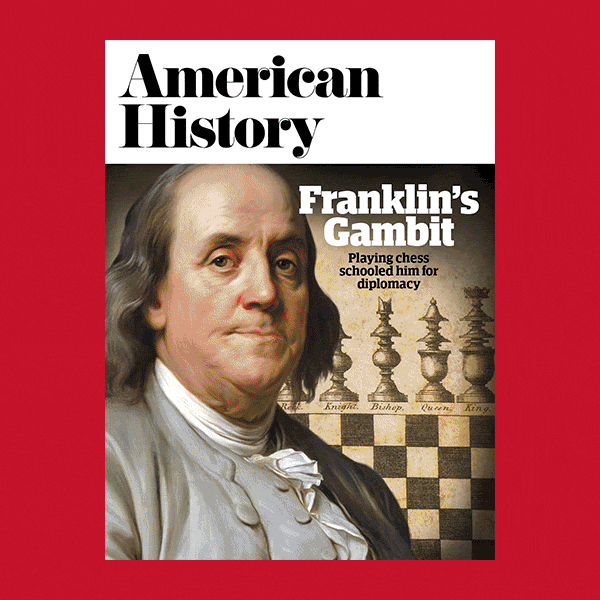Henry Clay, nicknamed the Star of the West and the Nice Compromiser, served as Speaker of the U.S. Home of Representatives and a U.S. Senator from Kentucky, however he’s much less identified right this moment than he was in his personal time and for a lot of the twentieth century. Time usually takes a toll on the well-known, even after they’ve completed nice deeds, however Clay, a average politician through the turbulent antebellum a long time earlier than the Civil Conflict, ought to stand as considered one of our perennial American heroes as a result of his efforts within the nationwide authorities persistently introduced the nation again from the brink of catastrophe. At present, when compromise appears to be a foul phrase in politics, Clay lets us do not forget that the give and take of politics is exactly what retains a democracy alive.
He was born in Virginia in 1777, lower than a 12 months after the Declaration of Independence. As a younger man, he learn legislation in Richmond and clerked for the well-known lawyer and scholar, George Wythe of Williamsburg, earlier than transferring to Kentucky. Later in life, he claimed humble origins for himself, however his father (who died younger) and his mom (who later remarried) firmly belonged to the frontier class often known as the middling type.
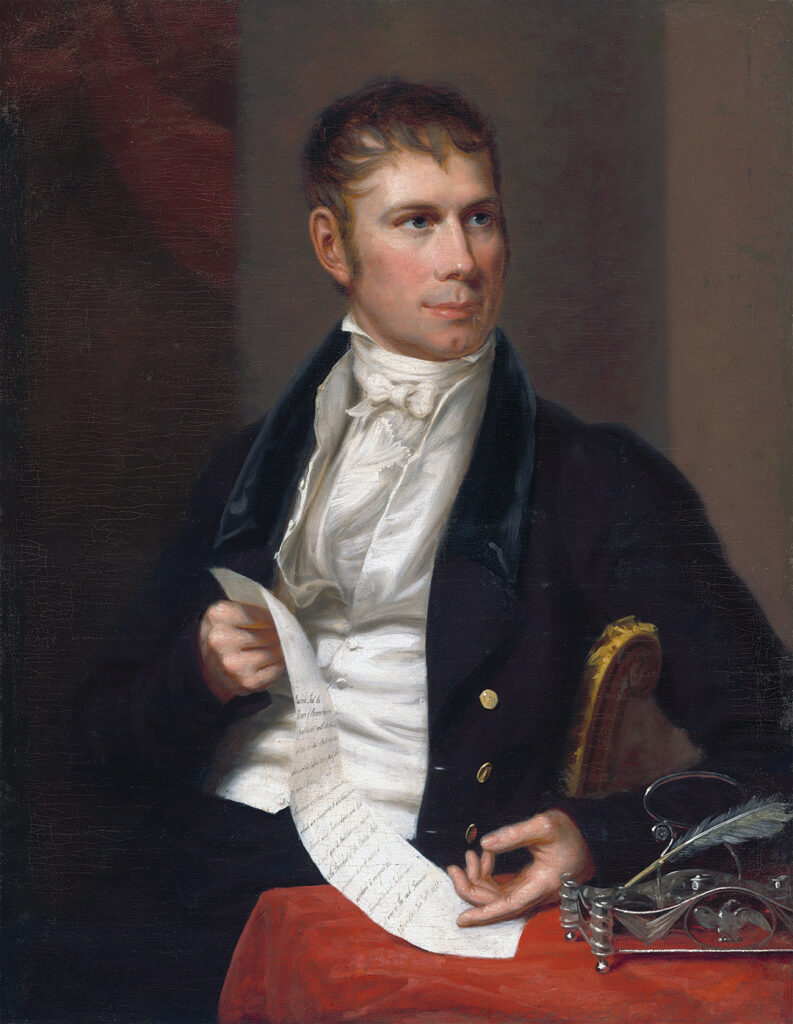
(Heritage Photographs (Getty Photographs))
In Kentucky, Clay practiced legislation with extraordinary talent and attracted shoppers who expanded his community of political contacts and social climbers among the many elite of Lexington, the seat of Fayette County within the coronary heart of the Bluegrass area. Quickly he developed a popularity for laborious work and laborious play: he perfected his public talking abilities, modeling himself on Patrick Henry, wooed jurors handy down verdicts in his shoppers’ favor, and relaxed by enjoying playing cards, playing on horses, and consuming.
In 1799, he married Lucretia Hart, the daughter of considered one of Kentucky’s main political figures. Marriage and the next delivery of 11 kids didn’t gradual him down—not in his work as an lawyer nor as a carouser who loved nothing greater than a card recreation lasting into the wee hours of the morning and a glass of clean Kentucky bourbon by his facet. Mates and admirers referred to as him “Prince Hal,” a reference to Shakespeare’s Henry V. When requested if she minded Clay’s playing, Mrs. Clay replied coolly: “Oh! expensive, no! He ’most all the time wins.” In the meantime, whereas he wasn’t in card video games or on the racetrack, he discovered consolation at his spectacular home, Ashland, a sprawling, whitewashed brick mansion simply outdoors of Lexington. Guests approaching the stately home usually heard wafting melodies despatched aloft by Clay on his fiddle or Lucretia on her piano.
Tall and slender in stature, with wispy blond hair that exposed a excessive brow, an angular face with spherical eyes, a protracted slender nostril, full lips, and protruding ears that stored him from ever being described as good-looking, Clay rose shortly in state and nationwide politics. After being elected to the decrease home of the Kentucky legislature in 1803, he briefly stuffed a vacant seat within the U.S. Senate, efficiently defended Aaron Burr towards prices of conspiring to invade Spanish territory (solely later did President Thomas Jefferson order Burr’s arrest for treason, however lack of proof led to Burr’s acquittal), and have become speaker of the Kentucky Home of Representatives. Though even tempered, his blood might typically run scorching, and he, like different Westerners, protected his private honor with a rigor that sometimes led him into folly. In 1807, for example, he quarreled with a fellow legislator over Jefferson’s Embargo, and when his political opponent referred to as him a liar, he challenged the person to a duel, a showdown that ended with each males wounding one another. It was not the one duel he fought over politics.
Beginning out as a Jeffersonian Republican, he slowly drifted towards Hamiltonian home insurance policies that seemed to the federal authorities for help of financial improvement, a coverage that might help commerce within the West and tie the nation’s separate areas collectively. Clay took a average place on the difficulty of slavery (he argued for the gradual manumission of slaves and later grew to become a founding father of the American Colonization Society, a gaggle of distinguished nationwide leaders who sought to free slaves and pay for his or her return to Africa) and maintained an unbridled perception that the West was the nice stronghold of democracy. In 1810, he stuffed a vacant U.S. Senate seat as soon as extra and spent quite a lot of time crying out towards Nice Britain’s impressment of American sailors on the excessive seas and its failure to adjust to the stipulations of the peace treaty of 1783 that ended the Revolutionary Conflict—specifically, British refusal to desert their forts and outposts within the West.
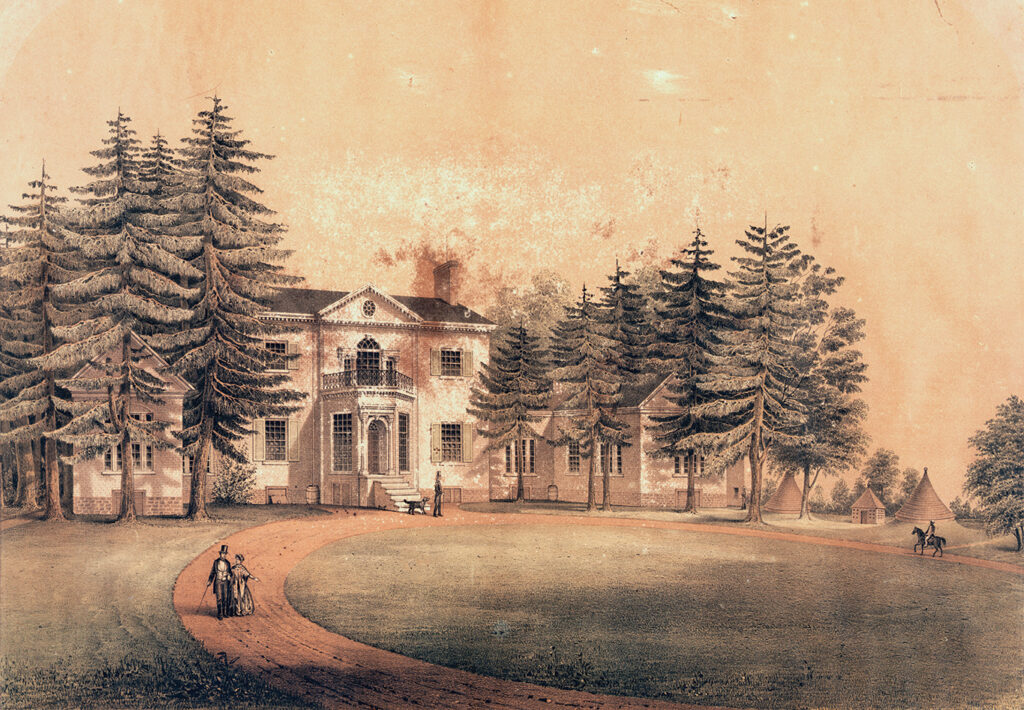
(Library of Congress)
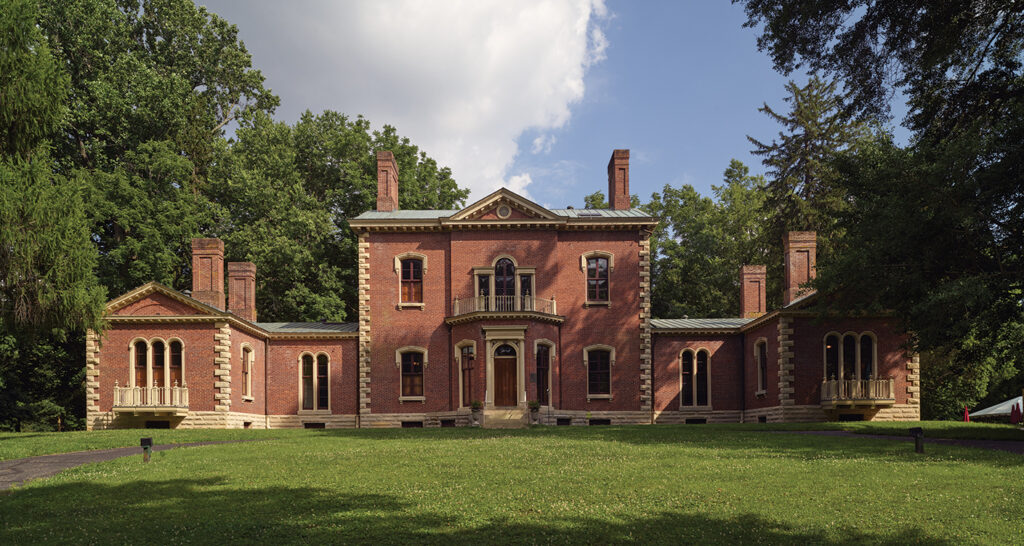
(Library of Congress)
Clay and others, who grew to become often known as Conflict Hawks, labored diligently in Congress for a declaration of struggle towards Nice Britain. All the time eloquent and authoritative, Clay’s rousing speeches prompted John Quincy Adams to comment that the Kentuckian was a “republican of the primary hearth.” Over his lengthy political profession, he would turn out to be often known as “the best pure orator the world ever produced,” which, naturally was a gross exaggeration, however his effectiveness in delivering a speech was by no means unsure.
Having turn out to be a family identify, Clay received election to the U.S. Home of Representatives, which he most well-liked to the “the solemn stillness of the Senate Chamber.” When he took his seat in November 1811, he was elected Speaker of the Home, an achievement that exposed how politically astute he was and the way widespread he had turn out to be. However the Conflict of 1812 went badly for the nation, a lot in order that Washington, D.C., fell into enemy fingers, and the British unceremoniously burned town, forsaking the charred stone shells of the Govt Mansion, the Capitol, and the Library of Congress. Within the meantime, President James Madison requested Clay to function considered one of 5 American envoys—John Quincy Adams, Albert Gallatin, James A. Bayard, Sr., and Jonathan Russell—to barter an finish to the struggle with a British delegation in Ghent.
In Belgium, the ebullient Clay performed in earnest, usually staying out all night time, playing and consuming to extra. His wanton habits aggravated his extra staid colleagues and broken his in any other case excessive political popularity. After agreeing on a peace treaty that returned the warring nations to establishment ante bellum, which meant that the doc failed to handle any of the problems that brought about the struggle within the first place, Clay returned to Congress, held the speakership as soon as once more, and commenced to place collectively the political elements of what would turn out to be his “American System,” arguing for a excessive protecting tariff to encourage home business, a constitution for a robust nationwide financial institution (that’s, a continuation of Hamilton’s Financial institution of the US), and authorities help of inner enhancements (roads, canals, steamboats), all of which he noticed as steps to enhance American unity, prosperity, and, specifically, Western progress. Clay promoted his American System not just for what he believed could be the good thing about your entire nation but in addition for the sake and well-being of his constituents—Westerners whose nationalistic and patriotic propensities soared simply as excessive as his personal.
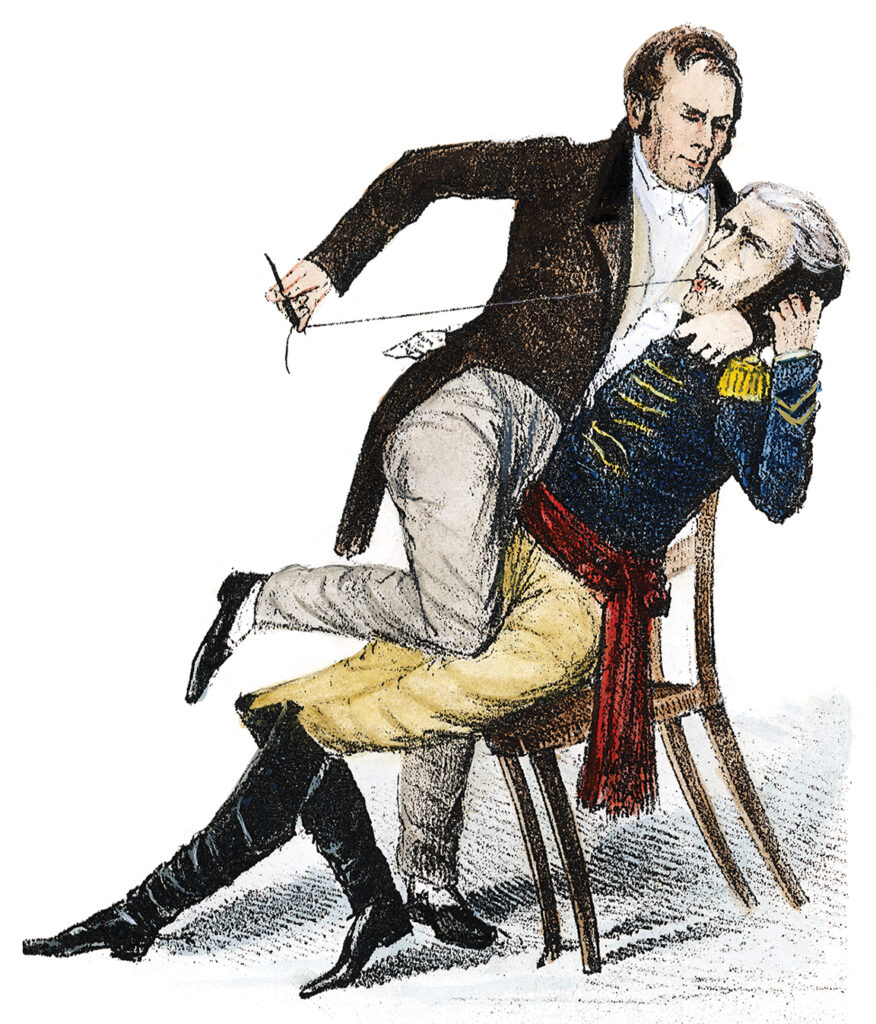
(Sarin Photographs (Granger))
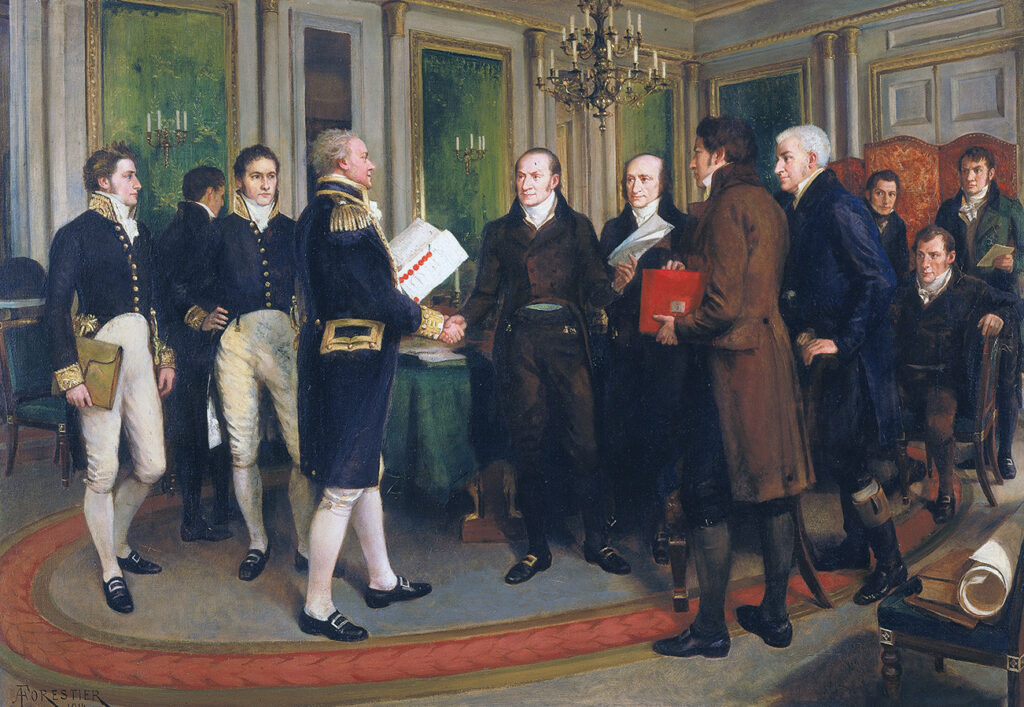
(Smithsonian American Artwork Museum)
However Clay, who was immensely widespread in Kentucky and the Previous Northwest, couldn’t keep away from making political enemies. Clay opposed almost each coverage advocated by President James Monroe and his administration. His forceful and succesful wielding of political energy as Speaker of the Home earned him respect, but in addition the disdain of mates and foes alike. He redeemed himself, nevertheless, by enjoying the mediator through the political battle that erupted in Congress over the admission of Missouri into the Union.
Privately Clay opposed slavery in Missouri, however within the Home of Representatives he labored selflessly and tirelessly for compromise, an indication of his Western practicality and commonsense method to overcoming political standoffs. He didn’t, as many have assumed, body the fundamental provisions of the compromise, however he ensured—typically utilizing questionable parliamentary ways—that the separate laws to confess Maine as a free state and Missouri as a slave state handed within the Home.
Clay’s position within the Missouri query received him nationwide acclaim. The president of the Second Financial institution of the US, Langdon Cheves, lavished him with reward: “The Structure of the Union was at risk & has been Saved.” In Missouri, the state’s new U.S. Senator, Thomas Hart Benton, referred to as Clay the “Pacificator of ten hundreds of thousands of Brothers.”
His talent at forging compromise grew to become an indicator of his political model and character. As early as 1813, he had declared his view that “the true good friend to his nation, realizing that our Structure was the work of compromise, wherein pursuits apparently conflicting had been tried to be reconciled, goals to extinguish or allay prejudices.”
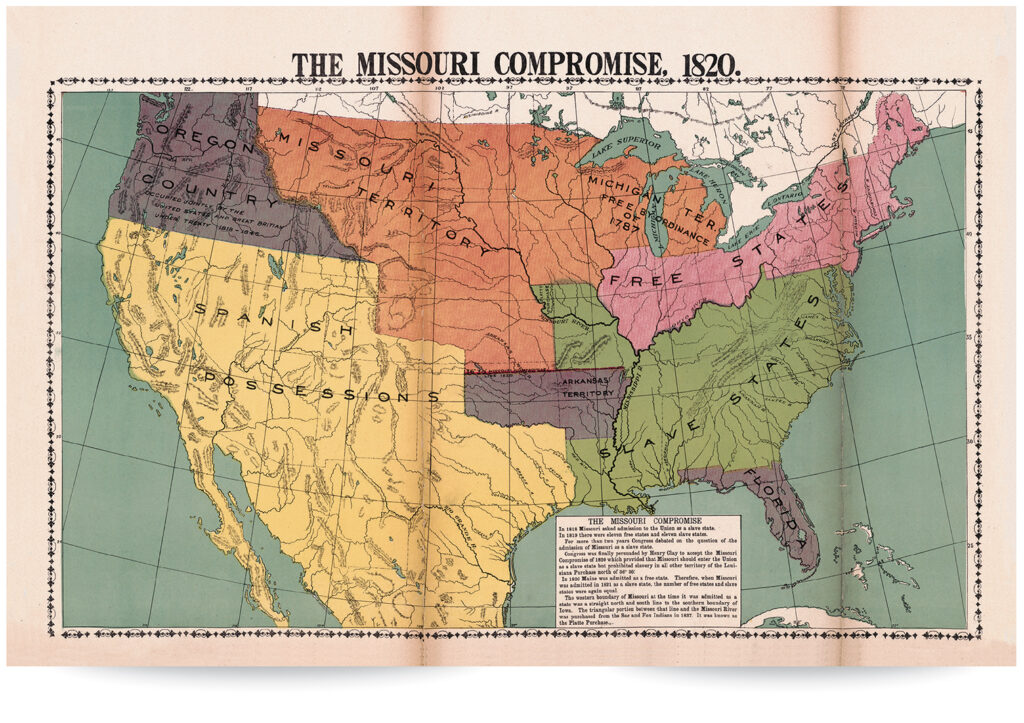
(Library of Congress)
Many years later, as he brokered the laws in Congress that might turn out to be the Compromise of 1850, he mentioned: “I’m going for honorable compromise at any time when it may be made. Life itself is however a compromise between loss of life and life, the battle persevering with all through our entire existence, till the nice Destroyer lastly triumphs. All laws, all authorities, all society, is fashioned upon the precept of mutual concession, politeness, comity, courtesy; upon these, the whole lot is predicated. …Compromise is peculiarly applicable among the many members of a republic, as of 1 widespread household.”
On the identical time, his adroit potential as an orator boosted his fame and his recognition. Some regarded him because the “Cicero of the West,” thus inserting him inside the nice pantheon of remarkable historical orators. A colleague within the Home of Representatives heard Clay ship a four-hour speech and drew a memorable portrait of the nice speaker in motion: “His mode of talking may be very forcible—He fixes the eye by his earnest & emphatic tones & gestures—the final of that are nevertheless removed from being swish—He ceaselessly shrugs his shoulders, & twists his options, & certainly his entire physique in probably the most dreadful scowls & contortions—But the entire appears pure; there isn’t any look of appearing, or theatrical impact.”
In 1821, after the shut of the Sixteenth Congress, Clay resigned his seat and returned to Lexington, the place his private funds lay in appreciable disarray, largely attributable to the Panic of 1819. Two years later, after reestablishing his monetary solvency, Clay received reelection to the Home and regained his seat as speaker. He succeeded in advancing the reason for the American System, shepherding laws by the Home for an extension of the Nationwide Highway past Canton, Ohio, and for a brand new protecting tariff that raised customized duties, a lot to the consternation of Southern opponents. Nearly from the second he returned to Washington, he started working for the presidency.
Competing in a discipline of 4 (the others had been John Quincy Adams, William Crawford of Georgia, and Andrew Jackson) within the election of 1824, Clay was the odd man out—a Westerner, like Jackson, however one who lacked sturdy help within the Southern slave states. He got here in fourth, however not one of the different candidates received a majority of the electoral votes, so the election went to the Home of Representatives, in adherence to the Twelfth Modification to the Structure. As speaker, Clay determined to vote for Adams, who received on the primary poll.
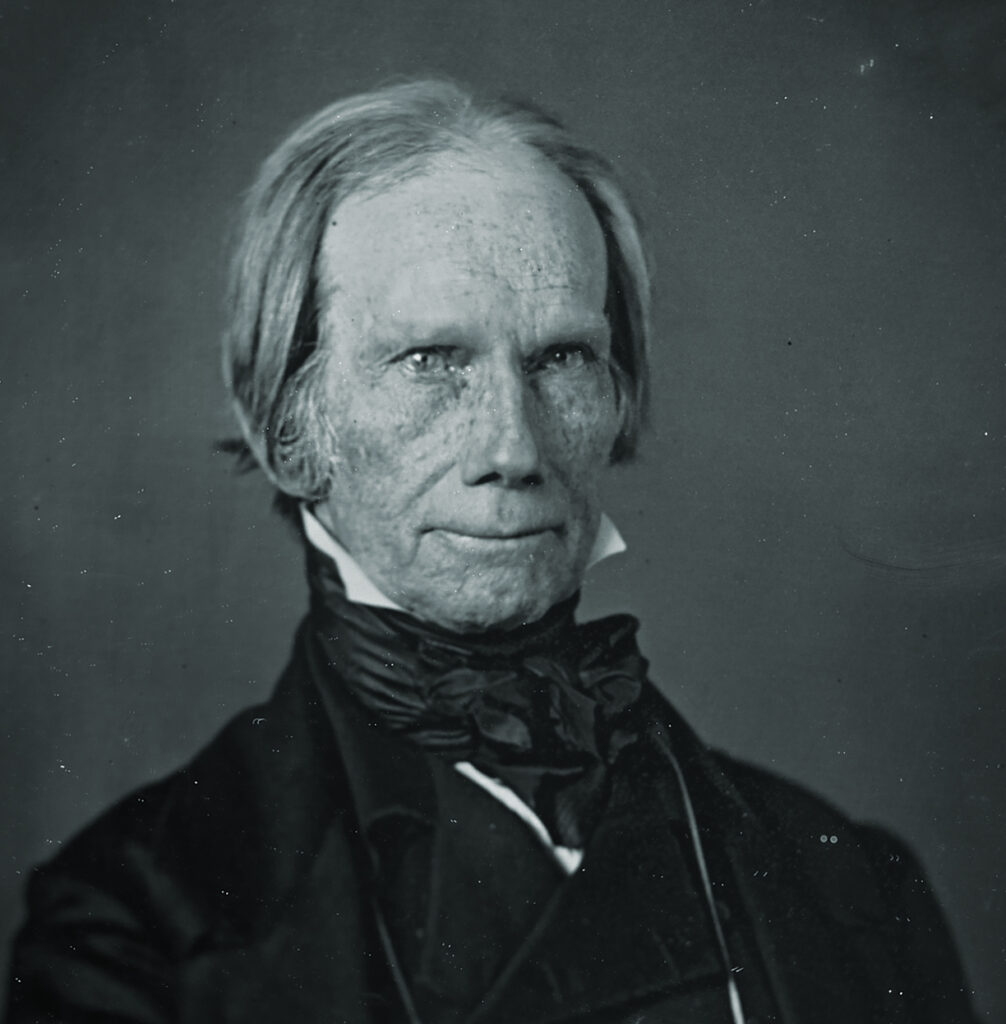
This picture was taken circa 1850, not lengthy earlier than his 1852 loss of life.
(Nationwide Portrait Gallery, Smithsonian Establishment)
When Adams appointed Clay Secretary of State, Jackson and his followers cried foul and accused the president and his cupboard nominee of getting entered right into a “corrupt cut price” earlier than any votes had been solid within the Home. It’s unlikely that Adams and Clay made a deal earlier than the Home might resolve the presidential election, however even when no specific phrases had been spoken or no handshake occurred between the 2 males, they every understood that Clay would vote for Adams and that the latter would thus really feel obliged to reward the Kentuckian for his help. Regardless of the case, Clay’s acceptance of the nomination and his tenure as Secretary of State haunted him for the remainder of his political profession, not as a result of he had engaged in corruption however as a result of the general public believed that he had.
All issues thought of, he proved to be a mediocre Secretary of State. Clay’s temperament didn’t match effectively with the necessities of an administrative place. Regardless of his celebrated affability, he stored making enemies, stepping on toes, offending his allies, and rubbing almost everybody the mistaken approach. On the finish of Adams’s time period, Clay took to the stump to marketing campaign for the president—one thing that no cupboard member had ever executed earlier than. Jackson, who had as soon as extra thrown his hat into the ring, attacked Adams and Clay relentlessly, retaining the epithet of cut price and corruption alive. In the long run, Jackson received the presidency in 1828, and Clay was out of a job. He returned to Ashland, picked up his legislation apply, and plotted his return to politics. His eye was on the presidential election of 1832. In 1831, the Kentucky legislature obliged him by electing him a U. S. Senator, a political put up he now not scorned. Clay assumed a management position within the Nationwide Republican Celebration. In Washington, he opposed Jackson with fierce dedication and took a stand to help the Second Financial institution of the US, which Jackson succeeding in eliminating throughout his first time period by vetoing a invoice to recharter the financial institution, claiming that it was an aristocratic and monarchial establishment created to provide unique privilege and different advantages to the wealthy.
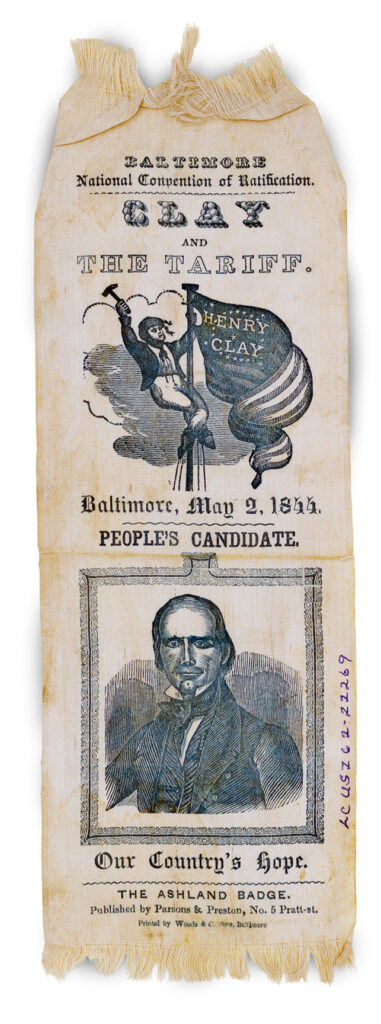
(Library of Congress)
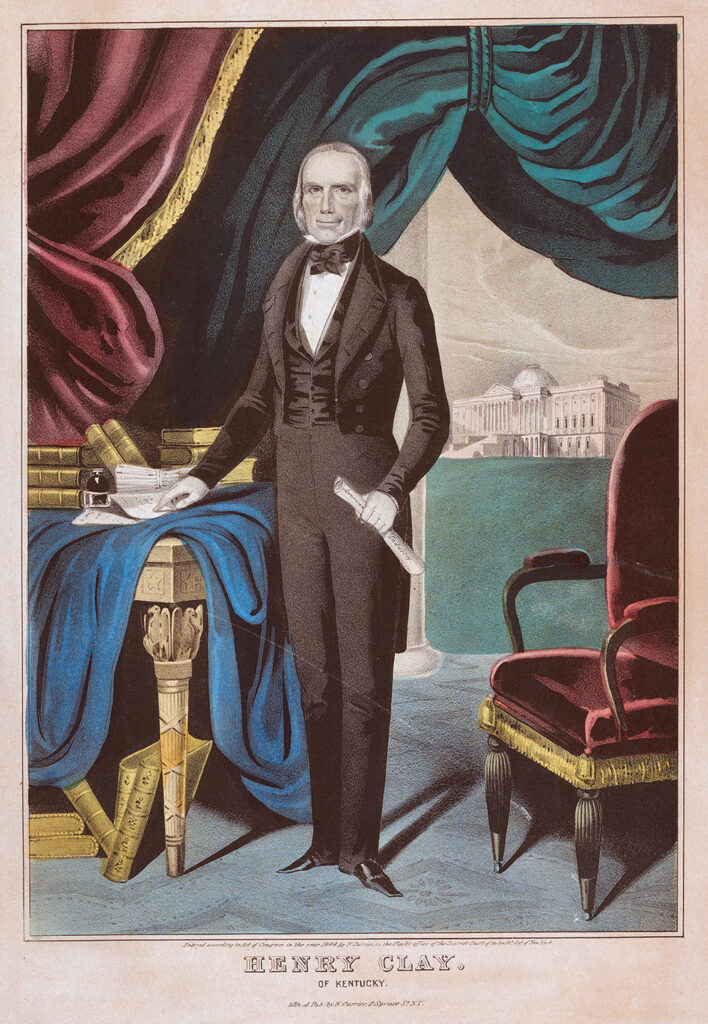
(Nationwide Portrait Gallery, Smithsonian Establishment)
The Financial institution Conflict, because the political contest got here to be referred to as, took middle stage within the election of 1832. Clay ran a spirited marketing campaign, however he couldn’t overcome the breadth and depth of Jackson’s big recognition. However, Clay continued his management of the Nationwide Republicans, who quickly modified their identify to Whigs, the opposition occasion to King Andrew I. Even so, Jacksonian democracy dominated the day, and Clay’s makes an attempt to push his American System within the Senate got here to nothing. As an alternative, Jackson vetoed the Maysville Highway Invoice, which proposed extending the Nationwide Highway into Kentucky.
Within the meantime, a sectional disaster—far worse than the Financial institution Conflict as a result of it threatened the survival of the Union itself—descended onto the shoulders of the nation, this time precipitated by South Carolina’s nullification of the Tariff Act of 1828, an motion taken in 1832 on the premise of John C. Calhoun’s principle of nullification, which held {that a} state possessed the constitutional authority to abrogate any federal legislation it disliked.
Effectively-known is President Jackson’s forceful response to South Carolina and his equally electrical condemnation of the nullifiers. After asking Congress for a Pressure Invoice to threaten South Carolina with navy invasion if vital, Jackson sought to keep away from such a calamity by additionally requesting Congress to cross a tariff extra acceptable to Southern pursuits. Into the breach stepped Henry Clay, the Nice Pacificator. He labored behind the scenes, lining up essential help for a compromise from Southern ultras (together with Calhoun) and Northern pro-tariff producers. Clay put collectively a compromise measure for a brand new tariff that might steadily decrease charges over a interval of nine-and-a-half years to a uniform 20 p.c advert valorem. On March 1, 1833, Congress handed Clay’s compromise tariff and Jackson’s Pressure Invoice collectively. The nullification disaster was over.
Clay was dedicated not solely to the precept of compromise but in addition to the concept of Union. But, like many Westerners (together with Abraham Lincoln) and People basically, Clay’s adherence to the Union got here much less from an ideological dedication to Union as a political concept and extra from a visceral, emotional love for the Union as a singular factor on this planet. Nowhere else on this planet might such a federation of separate provinces (virtually nations in their very own proper) be discovered. On the easiest degree, the Union was one thing historic and one thing tangible, one thing to be beloved with one’s coronary heart, not with one’s head.
Within the quick aftermath of the tariff dispute and the consummation of the compromise Tariff of 1833, Henry Clay’s popularity soared even greater than earlier than. However, because the Age of Jackson superior, regardless of all of the disagreements over tariffs, slavery, antislavery, and banks, People had been nonetheless gaining extra sophistication about how they perceived their political leaders and larger understanding of the forces that motivated males like Henry Clay. For the applause he obtained, many questioned simply how a lot of him was selflessly dedicated to the Union and the way a lot was merely lust for political distinction and private aggrandizement. To some, he was the “Savior of the Union.” To others, he was “a most valuable scoundrel.” It’s hardly stunning that Clay’s biggest recognition could possibly be discovered within the West, amongst individuals who considered him as their very own. To Westerners, Henry Clay was “the Star of the West.”
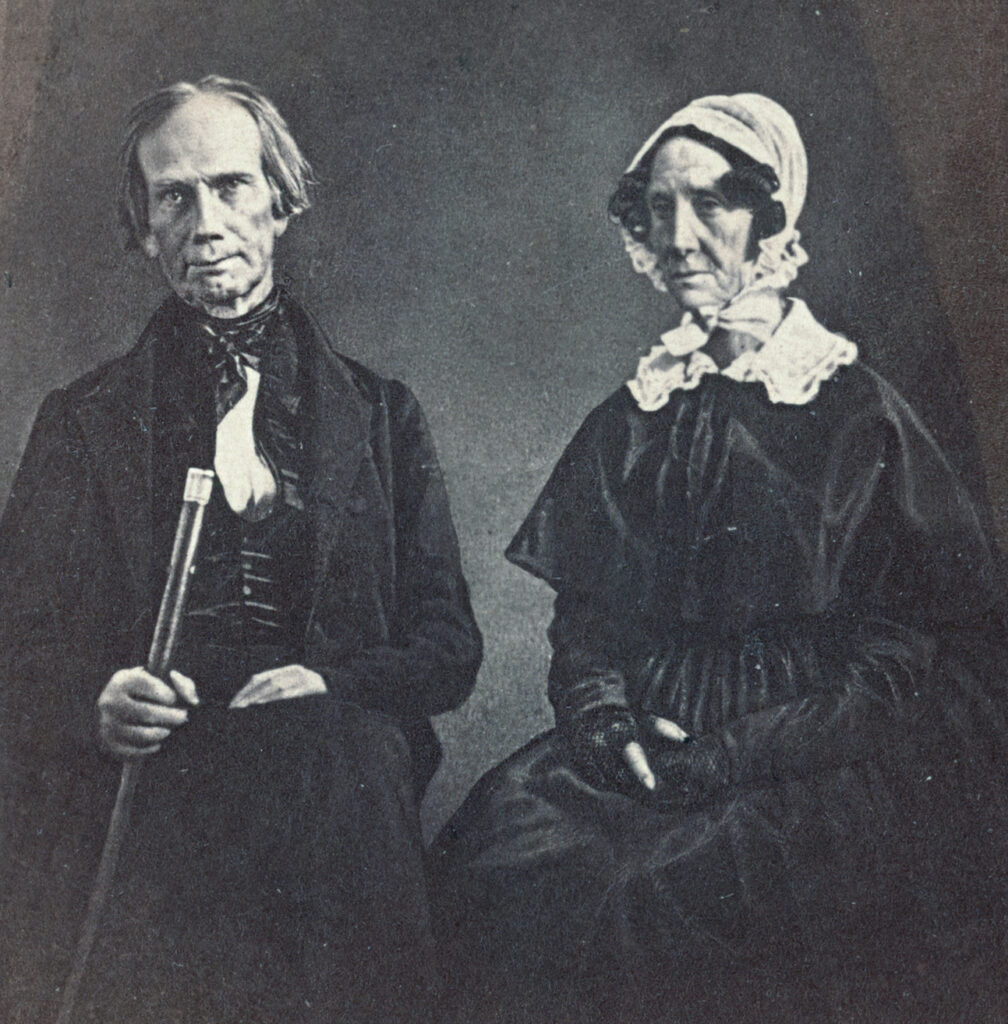
(Library of Congress)
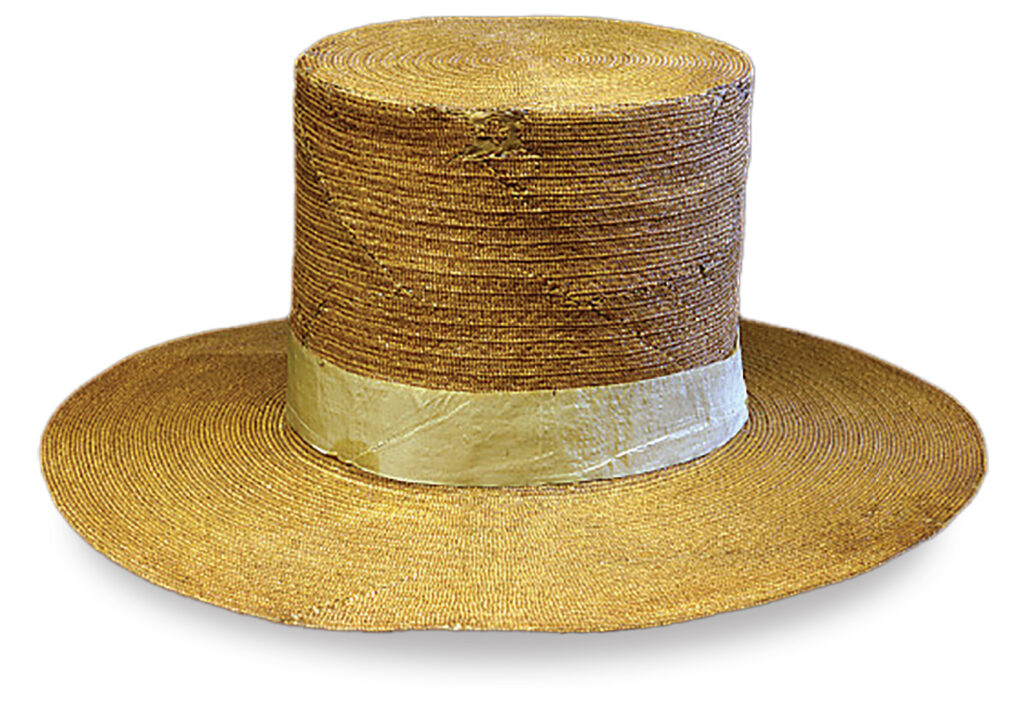
(Nationwide Museum of American Historical past, Smithsonian Establishment)
Westerners set nice retailer by him, relied on him, seemed to him to maintain their part advancing towards a shiny horizon of progress and shield the Union from being torn to items by pro-slavery apologists and antislavery proponents. Time and again, his supporters within the West nominated him as a presidential candidate, however that prize eluded him, a lot to his personal disappointment and that of those that beloved him so dearly. His unhealthy luck on the nationwide political scene, nevertheless, by no means discouraged his devoted followers.
It did, nevertheless, delight his enemies. “Harry the Obtainable,” they referred to as him derisively, however Clay put up a great entrance and continued within the Senate to serve Kentucky, his area, and the Union as greatest he might. Westerners discovered consolation in Clay the person and Clay the legend. At occasions in Congress, he was conceited, merciless, domineering, jealous, and irritable, however his adherents within the West heard little about his much less engaging traits except they occurred to learn an anti-Whig newspaper, which they knew already might by no means be trusted to inform the reality. Quite the opposite, Westerners trusted Clay and by no means believed what his opponents would possibly say about him. To them, Henry Clay was “the assistance and the hope of the West.”
Within the years that adopted Clay’s good success in 1833, Westerners like Abraham Lincoln watched him show his formidable sagacity and shrewdness within the political area and studied him as a political exemplar, the person in public workplace most worthy of emulation. In time, Abraham Lincoln got here not solely to admire Clay and his Whig politics, however held his fellow Kentuckian in such excessive esteem that he referred to as the Nice Compromiser the “beau excellent of a statesman.” Clay, mentioned Lincoln, was somebody he had supported “all my humble life.” Lincoln was not alone in his sentiments. Lincoln by no means met Clay, however he did see him ship a speech as soon as in Lexington, Kentucky, in 1847.
However Clay’s nice powers couldn’t final endlessly. At house, his beloved mansion, Ashland, started to crumble when its bricks grew to become so porous one might stick a finger in them. The implacable deterioration of Ashland was a becoming metaphor for what Clay was witnessing, experiencing, and making an attempt to treatment as his nation drifted by the a long time, struggling its personal share of sudden fissures, impermanent mends, and unrelenting declension—all the results of the South’s ceaseless calls for for political lodging that might shield slavery endlessly, even whereas the turmoil over the peculiar establishment weakened the ties that after had held the nation firmly collectively in a Union that many People, North and South, East and West, actually hoped could be perpetual.
After Clay’s unsuccessful try and acquire passage of the Compromise of 1850, a single piece of laws—referred to as an “Omnibus Invoice”—with eight disparate elements, he let Senator Stephen A. Douglas of Illinois, a Democrat, push the compromise by Congress as separate payments. For a short while, the Compromise of 1850 quieted the Southern extremists who had begun shouting for secession. Within the meantime, Clay grew weak and ailing. Loss of life, somewhat than Life, had caught up with the Nice Compromiser. On June 29, 1852, Clay died of tuberculosis in a Washington lodge. He was 75. With him—though nobody might see it on the time— the Whig Celebration died, too.
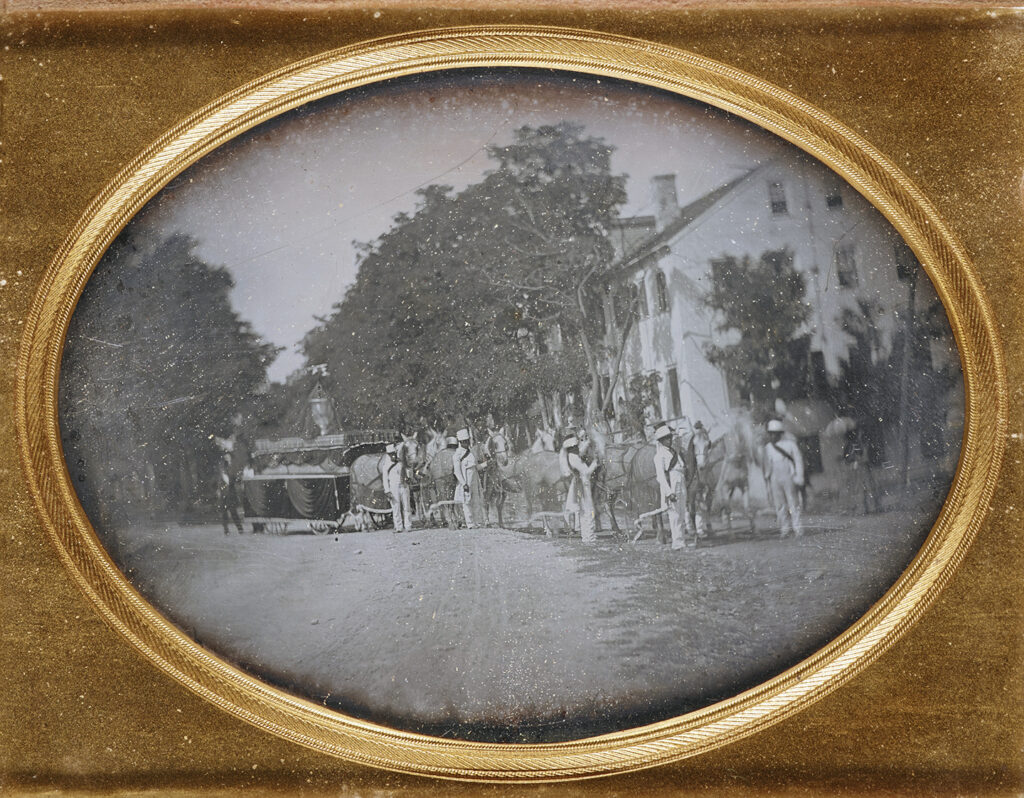
(College of Kentucky Libraries)
On July 6, Lincoln delivered a prolonged eulogy on Clay on the Corridor of Representatives within the Illinois State Capitol. For this memorial gathering, Springfield companies had been closed, residents stopped their regular routines, “and the whole lot introduced the final sorrow on the nice nationwide bereavement.” In Clay, Lincoln discovered the essence of America in his rise from poor household circumstances to one of many biggest political leaders within the nation. “Mr. Clay’s lack of a extra excellent early schooling, nevertheless it might be regretted usually, teaches a minimum of one worthwhile lesson; it teaches that on this nation, one can scarcely be so poor, however that, if he will, he can purchase ample schooling to get by the world respectably.” Evidently, Lincoln might have been describing himself and his personal path in life. For all his nice contributions throughout his lifetime, mentioned Lincoln, the nation must be extra grateful for a way Clay stood agency as a defender of the Union: “In all the nice questions which have agitated the nation, and significantly in these nice and fearful crises, the Missouri Query—the Nullification Query, and the late slavery query, as linked with the newly acquired territory, involving and endangering the soundness of the Union, he has been the main and most conspicuous half.”
In Kentucky right this moment, Clay is much less remembered than he must be and fewer a family identify than Senator Mitch McConnell. Kentucky’s different U.S. Senator, Rand Paul, takes pleasure in occupying Henry Clay’s Senate desk. However even Daniel Boone, by no means completed as a lot as Clay did. He served his constituents effectively by elevating Kentucky’s political status on the nationwide stage. On the identical time, he served his nation with love and constancy, nobly incomes one other nickname, the “Savior of the Union.” He was—and stays—one of many biggest U.S. Senators this nation has ever had, this man who deeply beloved the Union, this Henry Clay, the Star of the West.
Glenn W. LaFantasie is the Richard Frockt Household Professor of Civil Conflict Historical past Emeritus at Western Kentucky College. He has written usually for American Historical past.
Clay’s Slavery Compromise
Irrespective of how passionate Henry Clay felt in regards to the Union, his was a Union wherein whites alone loved the blessings of liberty. However Clay’s emotion for the Union was a white man’s concupiscence. “I’m,” pronounced Clay, “no good friend of slavery. The searcher of all hearts is aware of that each pulsation of mine beats excessive and robust in the reason for civil liberty. . . . However I desire the freedom of my very own nation to that of different individuals; and the freedom of my very own race to that of another race. The freedom of the descendants of Africa within the United State is incompatible with the security and liberty of the European descendants.” Clay most well-liked to dream about colonization, though as a sensible measure nobody might afford to purchase the enslaved their freedom and canopy the prices of delivery them to Liberia, Africa.
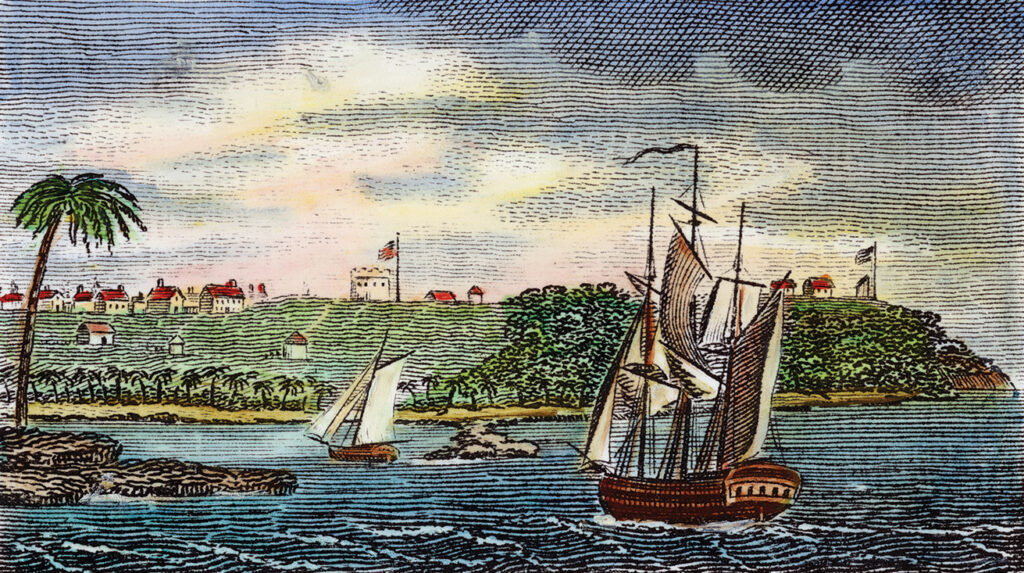
(Sarin Photographs (Granger))
This story appeared within the 2024 Winter concern of American Historical past journal.
historynet magazines
Our 9 best-selling historical past titles characteristic in-depth storytelling and iconic imagery to have interaction and inform on the individuals, the wars, and the occasions that formed America and the world.


